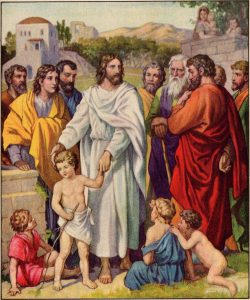 Jesus teaches his disciples that the greatest are those who serve all.
Jesus teaches his disciples that the greatest are those who serve all.
Today the disciples are uncharacteristically silent, afraid and ashamed, seemingly unaware that Jesus had overheard their arguing. A small child, like an eager puppy, has managed to squirm his way through the crowd and is waiting for Jesus to notice him. Jesus lifts him up and the child settles comfortably onto his lap. The child unknowingly becomes the lesson.
Now, don’t fail to understand the significance of this action. You see, in first-century Palestine, children were without status or power, possessing no legal rights whatsoever. They were totally subject to the authority of others. Most often, when children are mentioned in the Scripture, they’re lumped together with the others considered lowest on the food chain: women, cattle and foreigners.
Using the child as an example, Jesus is teaching us that when we serve the least ones among us, we serve Jesus himself. Who are the people today without power or status in our society that Jesus is calling us to serve? Do we do so willingly? Does our hospitality extend to the people Jesus would choose? This is the criteria upon which we will be judged.
Jesus says: “See, the greatest people in the kingdom of God are not the rich and powerful. They are the weak and powerless; not the ones with the most servants, but the ones who serve others the most. The “greatest” are the servants of others … wash the dishes, do the laundry, sweep the floor, pull the weeds, visit the sick, sign up to read, take non-drivers shopping – you know the list … it goes on and on filled with everyday tasks that help make community life run smoothly.
What is the one human quality that was underlying the argument among the disciples? The quality that drives us to success while causing all sorts of problems at the same time? Ambition. Ambition is one of the driving forces in our lives. It propels us to excel in our jobs. It pushes us to reach our goals. It can give us a reason for living. Ambition is one of the tools that the world uses to measure success. But, it is only one tool.
If we measure success the way the world does, we will overlook some ordinary people who did extraordinary things. They probably did not realize what a role they played in the “Greatest Story Ever Told” until perhaps they looked back on history form God’s heavenly perspective.
Just to name a few, let’s look at a some of the Scriptural figures we know – what do we remember them for? Noah built; Abraham moved; Moses led; Josiah restored; David conquered; Nehemiah repaired; Ruth stayed; Jeremiah preached; Mary said “yes”; Joseph accepted; the poor widow gave; the Apostles went; the early church persevered.
An everyday example presented itself recently in a back-page news story about a couple of school children. One had gotten into some minor trouble and was going to have to walk a few laps instead of playing at recess. She wasn’t taking the news very well. Another student, a by-stander who wasn’t even a close friend stepped up quietly to offer encouragement. She whispered to her peer that she wouldn’t have to walk alone; she’d walk with her to cheer her on. When the teacher remarked what a wonderful thing she had done, the student shrugged and replied, “It’s no big deal. It’s what we’re supposed to do.”
Can you image our world if everyone had the same attitude? It’s those kinds of thinkers who are changing the world. Those who forgive, love, go the extra mile, and live righteously, not out of a sense of obligation, not to be seen and applauded by others, but simply because “that’s what we’re supposed to do.”

